The first human pilot study on intravenous BPC-157 demonstrates safety and tolerability, while preclinical data suggests potential in gut health, wound healing, and neuroprotection.
The synthetic peptide BPC-157 shows promise in early human trials, but rigorous clinical validation is still needed.
First Human Pilot Study on BPC-157: Safety and Tolerability Confirmed
The first pilot study investigating intravenous BPC-157 administration in humans has reported promising safety and tolerability results. While full data has not yet been published in a peer-reviewed journal, preliminary findings presented at the 2023 Regenerative Medicine Symposium indicated no serious adverse effects at therapeutic doses. This is an important first step, but we must remain cautious until larger, controlled trials are completed,
noted Dr. Elena Petrovic, a researcher involved in the study.
BPC-157, a synthetic peptide derived from a protective protein in gastric juice, has been used anecdotally in Eastern European sports medicine for decades, primarily for muscle and tendon injuries. However, its mechanism of action remains incompletely understood, and regulatory approval pathways are still being established.
Historical Use and Current Applications
Originally developed in Croatia, BPC-157 gained attention for its remarkable healing properties in animal models. A 2023 review in Biomolecules
highlighted its multi-target therapeutic potential, including anti-inflammatory, angiogenic, and tissue-regenerative effects. Recent preclinical studies, such as those published in Frontiers in Pharmacology
, have demonstrated its ability to protect against NSAID-induced gut damage and accelerate wound healing.
Researchers at the University of Zagreb are currently exploring BPC-157’s neuroprotective effects, particularly in traumatic brain injury models. Our preliminary data suggests BPC-157 may help stabilize the blood-brain barrier and reduce secondary injury,
reported Dr. Marko Kovac in a university press release earlier this year.
Ethical and Regulatory Challenges
The growing off-label use of BPC-157 in sports medicine presents significant ethical concerns. Without large-scale human trials, its efficacy and long-term safety profile remain uncertain. The World Anti-Doping Agency has placed BPC-157 on its monitoring program, reflecting concerns about potential misuse in athletics.
From a regulatory perspective, BPC-157 exists in a gray area. While not FDA-approved, it’s increasingly available through compounding pharmacies and online sources. This creates a dangerous situation where patients may self-administer untested substances,
warned Dr. Sarah Chen of the Mayo Clinic in a recent editorial.
Future Directions in Research
Several pharmaceutical companies have expressed interest in developing BPC-157-based therapies, particularly for inflammatory bowel disease and chronic wounds. However, the path to FDA approval will require rigorous Phase II and III trials. The peptide’s complex mechanism of action – affecting multiple pathways simultaneously – presents both opportunities and challenges for drug development.
As research continues, the medical community remains cautiously optimistic about BPC-157’s potential while emphasizing the need for evidence-based medicine. The coming years will likely see increased investment in clinical trials to validate its therapeutic applications across various medical specialties.




